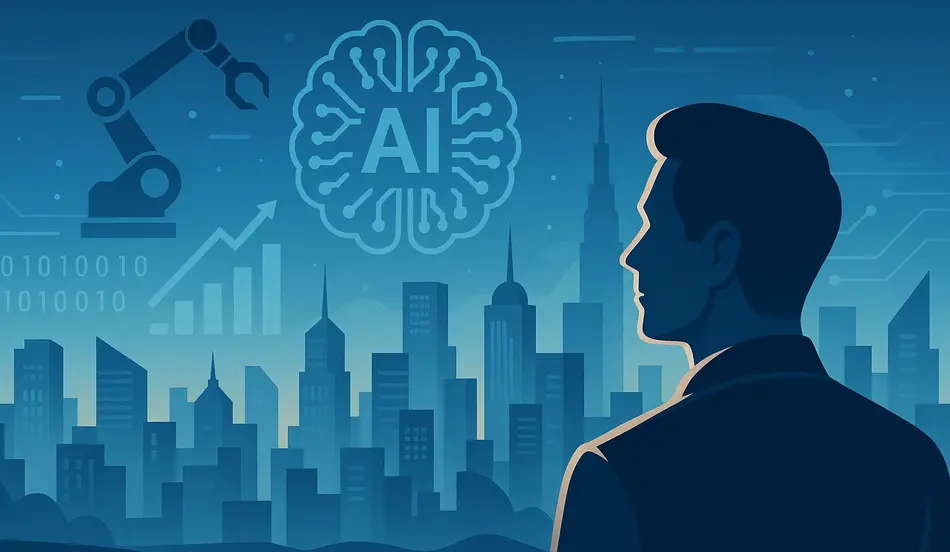Eric Schmidt, former Google executive chairman and CEO, who sees a future where AI agents will be incredibly powerful and work together in ways that will fundamentally transform how we work, live, and compete on the global stage. Schmidt’s vision goes far beyond the current hype around ChatGPT and other AI tools, predicting a world where computers will run on their own, deciding what they want to do, and possessing reasoning skills that surpass human capabilities.
This isn’t just about better chatbots or more efficient software – it’s about the arrival of a new non-human intelligence that will reshape entire industries, create new opportunities for job seekers, and determine which nations will dominate the 21st century. Schmidt’s insights come from decades of experience building some of the world’s most successful technology companies, and his predictions carry significant weight in the tech industry and beyond.
The Agentic Revolution: AI Agents Working Together
Schmidt’s vision centers on what he calls the “agentic revolution” – a future where AI agents will be incredibly powerful and will start to work together in sophisticated ways. These aren’t just individual tools or applications, but intelligent systems that can collaborate, share information, and make decisions autonomously.
The implications for job seekers and professionals are profound. Instead of AI simply replacing human workers, Schmidt predicts a future where humans and AI work together synergistically. “AI is not end to end. It’s middle to middle. Humans are end to end,” he explains. This means that while AI can handle complex tasks in the middle of processes, humans will still be needed to define objectives, provide context, and validate results.
This collaborative model creates new opportunities for professionals who can learn to work effectively with AI systems. Rather than being replaced, workers who can prompt AI effectively, iterate with it, and apply its outputs to real-world problems will be in high demand.
The China Competition: Why the West Must Win
Schmidt’s perspective on AI is deeply influenced by the geopolitical competition between the United States and China. “If you were emperor of the world for 1 hour, the most important thing I do is make sure that the west wins,” he states. This isn’t just about economic competition – it’s about ensuring that the values and principles of Western democracies shape the future of AI development.
The competition is particularly intense in the area of open-source AI. Schmidt warns that China is competing with “open weights and open training data” while the US is largely focused on “closed weights, closed data.” This means that the majority of the world, through initiatives like China’s Belt and Road, will use Chinese AI models rather than American ones.
For job seekers, this creates opportunities in companies and organizations that are working to ensure American technological leadership. The stakes are high, and the demand for skilled professionals who can contribute to this effort will only grow.
The Future of Warfare: Drones and Automation
Schmidt’s insights extend beyond AI to the future of warfare and national security. Drawing from his experience working with the Pentagon and observing the Ukraine conflict, he predicts a fundamental shift toward drone-based warfare that will make traditional military equipment obsolete.
“The kill ratio” is a key concept in this new paradigm. A $5,000 drone can destroy a $30 million tank, making traditional military hardware economically unsustainable. Schmidt predicts that future warfare will be characterized by:
• Drone vs. drone combat – Both sides will develop sophisticated drone capabilities
• AI-powered battle planning – Reinforcement learning will be used to develop battle strategies
• Mutual assured destruction – The uncertainty of AI battle plans will create deterrence
• Human soldiers as a last resort – After drone battles, humans will still need to cross lines
This transformation creates opportunities for professionals in defense technology, AI development, and robotics. The companies and individuals who can contribute to this new paradigm will be in high demand.
The Space Race: Relativity Space and Beyond
Schmidt’s investment in Relativity Space reflects his belief that the space industry is entering a new era of competition and opportunity. “Rockets are really cool and they’re really hard,” he explains, describing the technical challenges of building rockets with 4 million pounds of thrust.
The space industry represents another front in the competition between the US and China, with implications for national security, economic competitiveness, and technological leadership. Schmidt’s involvement in this sector creates opportunities for professionals with skills in aerospace engineering, rocket science, and space technology.
The order book for space launches is full, indicating strong demand for these services. This creates opportunities for professionals who can contribute to the development of next-generation space technology and services.
The Population Crisis: A Fundamental Challenge
Schmidt identifies declining birth rates in the West as a fundamental challenge that could undermine economic growth and innovation. “One metric of the success of a society is its ability to reproduce,” he states, noting that birth rates are declining across developed nations.
The implications for job seekers and businesses are significant. A shrinking population means fewer customers, declining revenue, and reduced opportunities for innovation. Schmidt advocates for immigration as a solution, but also emphasizes the need to address the underlying causes of declining birth rates.
This demographic challenge creates opportunities for professionals who can help organizations adapt to changing population dynamics, develop new business models, and find innovative solutions to demographic challenges.
The Future of Work: Remote vs. In-Person
Schmidt’s views on remote work reflect his broader concerns about American competitiveness. “I am not in favor of essentially working at home,” he states, arguing that young professionals need in-person interaction to learn how the world works.
His reasoning is based on his own experience at Sun Microsystems, where he learned from “elder people who were 5 or 10 years older than I was argue with each other in person.” This kind of learning, he argues, cannot be replicated in remote work environments.
However, Schmidt acknowledges that the Chinese work ethic includes “996” – working 9 AM to 9 PM, 6 days a week. This creates pressure for American workers to be more competitive, but Schmidt believes that in-person collaboration is essential for maintaining American technological leadership.
The Path to AGI: When Will We Get There?
Schmidt’s predictions about Artificial General Intelligence (AGI) are more measured than some of his peers. While he acknowledges that we’re moving toward forms of superintelligence, he believes true AGI – where AI can set its own objective functions – is still 6-7 years away.
The key challenge, according to Schmidt, is the “non-stationarity of mathematical proofs.” AI systems struggle with problems where the objective function keeps changing, which is how humans operate. “Your goal changes every day. Whereas computers have trouble with that.”
This creates opportunities for professionals who can work on the technical challenges of AGI development, including those who can solve the problem of AI systems that can adapt their objectives based on changing circumstances.
The Role of America: Strengths and Challenges
Schmidt’s vision for America’s future is optimistic but realistic. “I want America to win,” he states, emphasizing the country’s strengths in capital allocation, financial markets, universities, and entrepreneurship.
However, he also acknowledges the challenges facing the West, including declining birth rates, social issues, and the need to maintain technological leadership. His solution is to “invest in the right people, in the right businesses, we have a strong capital market, we invest in the infrastructure that they need.”
This creates opportunities for professionals who can contribute to American technological leadership, whether through direct work in tech companies, supporting infrastructure development, or contributing to the broader ecosystem of innovation.
Frequently Asked Questions
What does “I honestly believe that the AI revolution is underhyped” mean?
“I honestly believe that the AI revolution is underhyped” means that Eric Schmidt believes the current discussion about AI’s impact underestimates how transformative AI agents working together will be, with computers eventually running autonomously and possessing reasoning skills that surpass human capabilities.
How will AI agents work together in the future?
AI agents will work together by collaborating, sharing information, and making decisions autonomously, creating a synergistic relationship with humans where AI handles complex middle-process tasks while humans define objectives and provide context.
Why is the competition with China so important for AI development?
The competition with China is crucial because China is using open-source AI models and training data while the US focuses on closed systems, potentially leading to the majority of the world using Chinese AI models through initiatives like the Belt and Road.
What is the future of warfare according to Eric Schmidt?
The future of warfare will be dominated by drone-based combat where $5,000 drones can destroy $30 million tanks, leading to drone vs. drone battles, AI-powered battle planning, and mutual assured destruction through uncertain AI strategies.
Why does Schmidt oppose remote work for young professionals?
Schmidt opposes remote work for young professionals because he believes they need in-person interaction to learn from experienced colleagues, arguing that the kind of learning he experienced at Sun Microsystems cannot be replicated remotely.
When does Schmidt predict we’ll achieve AGI?
Schmidt predicts we’ll achieve forms of superintelligence in 6-7 years, but true AGI where AI can set its own objective functions is still a significant challenge due to the “non-stationarity of mathematical proofs” problem.
What are America’s strengths in the AI competition?
America’s strengths include chaotic but clever innovation, smart capital allocation, deep financial markets, strong universities, and a robust ecosystem of entrepreneurs that other countries envy.
A Real-World Example: Sarah’s Journey into AI Collaboration
Sarah, a 28-year-old software engineer, was initially worried about AI replacing her job when ChatGPT first launched. “I thought my coding skills would become obsolete,” she explains. “But after listening to Eric Schmidt’s insights about AI being ‘middle to middle’ rather than end-to-end, I realized there was still a crucial role for humans.”
Sarah decided to focus on learning how to work effectively with AI systems rather than competing against them. “I started studying prompt engineering, learning how to iterate with AI tools, and understanding how to validate and apply AI outputs to real business problems,” she says.
Within a year, Sarah had become the go-to person in her company for AI integration projects. “I’m not just coding anymore – I’m designing workflows where AI handles the complex processing and I handle the strategic thinking and problem definition,” she explains.
Sarah’s story illustrates how Schmidt’s vision of human-AI collaboration is already playing out in the real world. “The key is to focus on what humans do best – defining objectives, providing context, and making strategic decisions – while letting AI handle the heavy computational work,” she advises.
Position Yourself for the AI Revolution
Eric Schmidt’s vision of the AI revolution offers both challenges and opportunities for job seekers and professionals. The key is to understand that AI won’t replace humans entirely, but will transform how we work and what skills are most valuable.
The future belongs to those who can work effectively with AI systems, contribute to American technological leadership, and adapt to the rapidly changing landscape of work and technology. Whether you’re interested in AI development, defense technology, space exploration, or simply want to thrive in an AI-powered world, the opportunities are there for those who are prepared.




